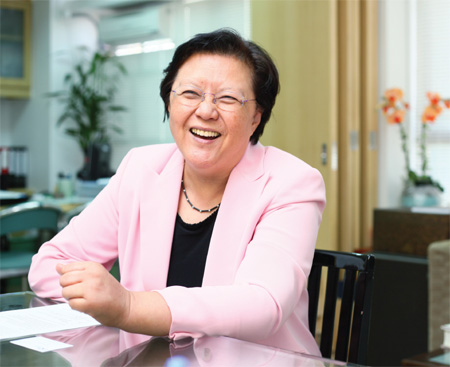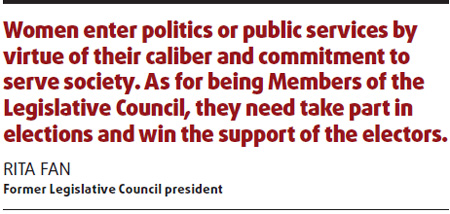A new era for women in politics
Updated: 2009-11-20 07:43
By Joseph Li(HK Edition)
|
|||||||

The number of women taking part in politics and public services has been rising over the years, says Rita Fan, a Standing Committee member of the National People's Congress. She sees this as a growing trend, as contemporary women are more highly educated and committed to serving society in different ways.
Since the handover in 1997 until 2008, Fan was president of the Legislative Council for 11 years, making her the first women speaker of the legislature in the history of Hong Kong.
Speaking to China Daily in an exclusive interview, she said that, in Hong Kong, women take up public services as a modern arena for their capabilities and desire for community commitment. In the case of women wishing to become Members of the Legislative Council, they have to take on elections and be accountable to their voters.
In terms of the number of women taking up careers in public services, she said Hong Kong compares favorably with the mainland, although there are more women taking up public service on the mainland in numerical terms.
"There is a quota system on the mainland," she explained. "For example, there must be at least one or more women in the provincial or municipal government leadership. Similarly, the ratio of women deputies in the People's Congresses should not be lower than 21 percent."
Three is however no such restriction in Hong Kong.
"In Hong Kong, women enter politics or public services by virtue of their caliber and their commitment to serve society. As for being Members of the Legislative Council, they have to take part in elections and be subject to the choices of the electors," she observed.
Elaborating, she said, "Equally, recruitment and promotion of civil servants are based on their capability and performance, but not sex preferences."
Fan attributed the growing number of women taking part in politics and public services to their increasingly higher educational qualifications and career achievements. As the number of female university graduates rises, the number of women civil servants is increasing too.
"Generally speaking, women who have a higher education standard have more choices in jobs. Besides, women are less money-minded and prefer a stable working environment, so they join the civil service," she enthused.
As to women taking part in politics, she said it is up to their own judgment, as women may face greater pressure to enter politics. "It is important to have support from the family," she said. "It is more important for married women to have support from their husbands, because they will surely have less time to take care of the family and children."
Fan recalled that when she first became an appointed Member of the Legislative Council in 1983, there were already quite a number of prominent women sitting in the legislature. At that time, society's feedback regarding women becoming politicians was quite positive and nobody thought it was very special.
And while Fan was still a novice, there was already Lydia Dunn, who later on became the senior unofficial member of the Legislative Council and then the Executive Council. There was also Maria Tam, who was the first woman sitting on four separate councils (urban services council and district council apart from ExCo and LegCo) at the same time.
"Also there were Dr. Henrietta Ip, who always criticized the government health policies right on target, as well as Selina Chow, who retired only last year," she recounted.
Fan went on to say that most of those women appointed as Members of the Legislative Council were elites or the cream of society, who had achievements in their own professions or otherwise made contributions to society.
But during those years, there were very few women from the grassroots taking part in public or community services, she noted.
It was because in traditional Chinese societies in the past, women needed to do housework and take care of their children. Then again, the educational attainments of women in those years were not high.
"I always encouraged women from the grassroots to take part in public and community services," Fan said.
However, in those days, not many of them could do so, because they had to do housework or had a job, and the government did not provide adequate baby-sitting services at district level.
"The situation has improved after the handover," she beamed, adding: "that's why now we have increasing numbers of female district council members and female chairpersons of district affairs committees."
From 1983 to the end of 1989, Fan still held a full-time job in addition to being a Legislative Council Member.
"As such, I had very little time for the family. Luckily as I lived with my mother-in-law, she ably took care of the family and the children. So I not only needed the support of my husband but also support of my mother-in-law," she smiled and said.

(HK Edition 11/20/2009 page4)